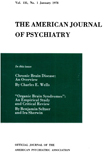Strategies and risks in psychotherapy with bilingual patients: the phenomenon of language independence
Abstract
The presence of two separate languages, each with its own lexical, syntactic, semantic, and ideational components, can complicate psychotherapy with proficient bilingual patients. If only one language is used in therapy, some aspects of the patients emotional experience may be unavailable to treatment; if both languages are used, the patient may use language switching as a form of resistance to affectively charged material. The authors suggest that monolingual therapists should carefully assess the degree of language independence in bilinguals in order to minimize its impact on therapy. They conclude that study of bilingual patients may provide important insights into the nature of the therapeutic process.
Access content
To read the fulltext, please use one of the options below to sign in or purchase access.- Personal login
- Institutional Login
- Sign in via OpenAthens
- Register for access
-
Please login/register if you wish to pair your device and check access availability.
Not a subscriber?
PsychiatryOnline subscription options offer access to the DSM-5 library, books, journals, CME, and patient resources. This all-in-one virtual library provides psychiatrists and mental health professionals with key resources for diagnosis, treatment, research, and professional development.
Need more help? PsychiatryOnline Customer Service may be reached by emailing [email protected] or by calling 800-368-5777 (in the U.S.) or 703-907-7322 (outside the U.S.).



